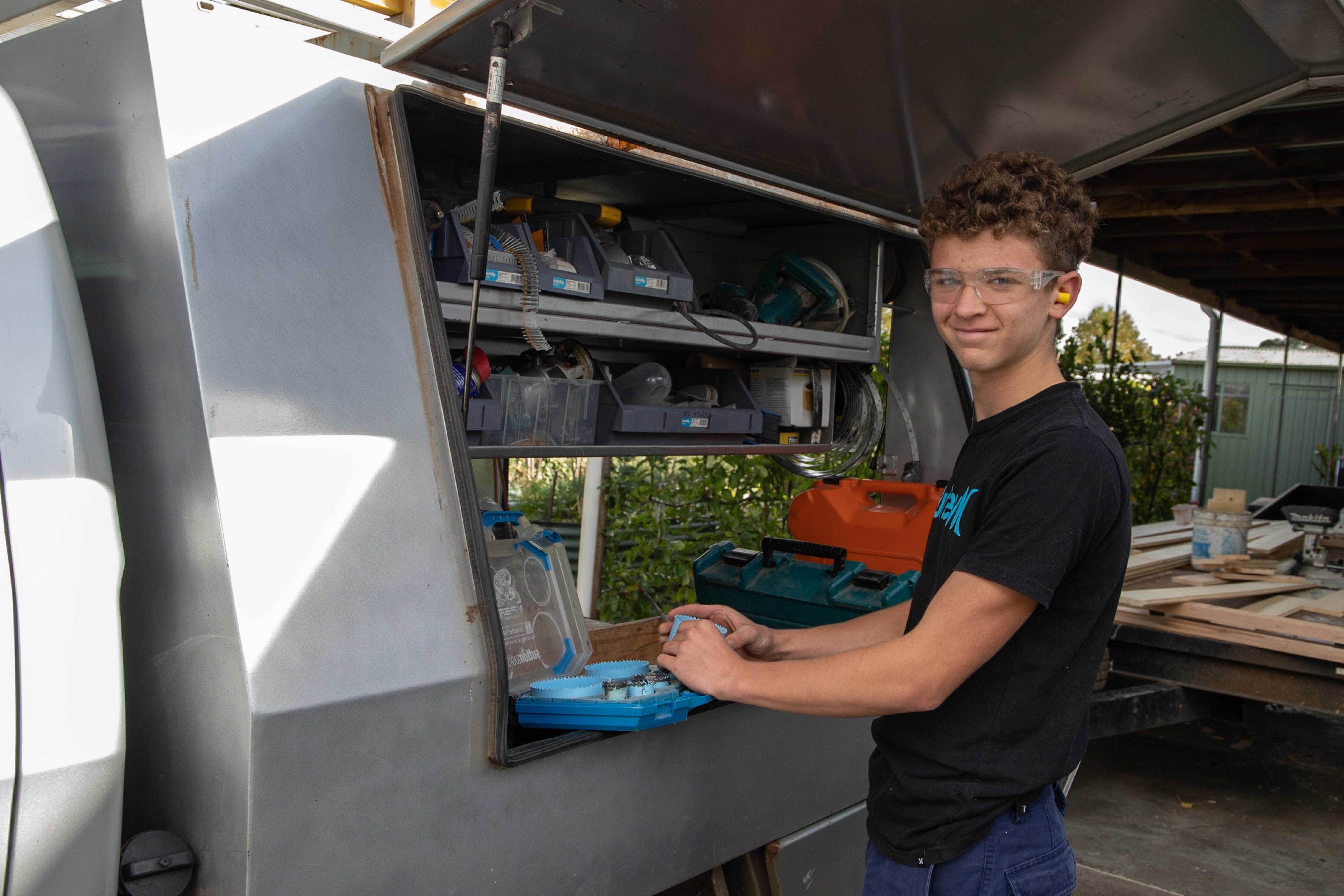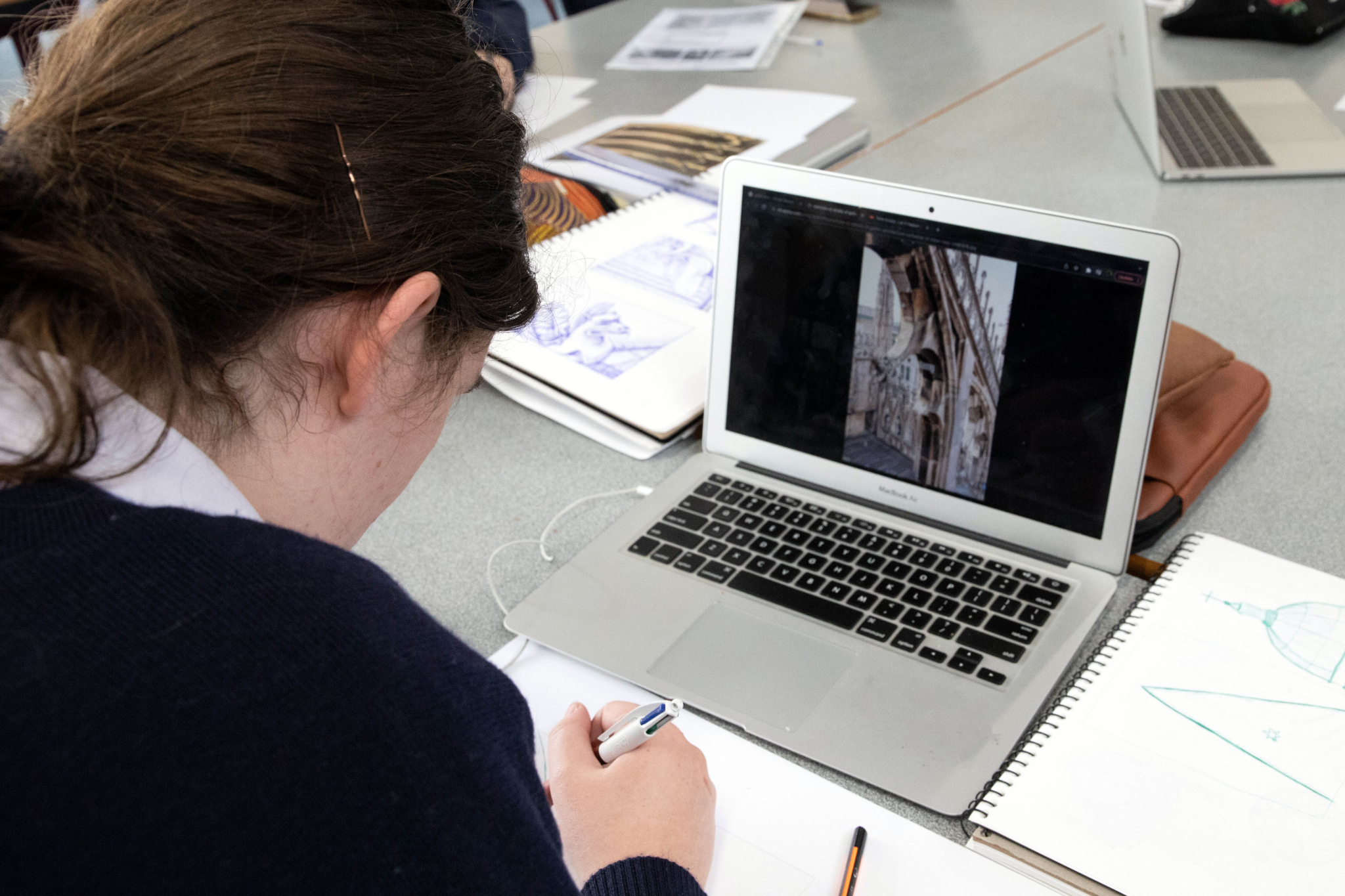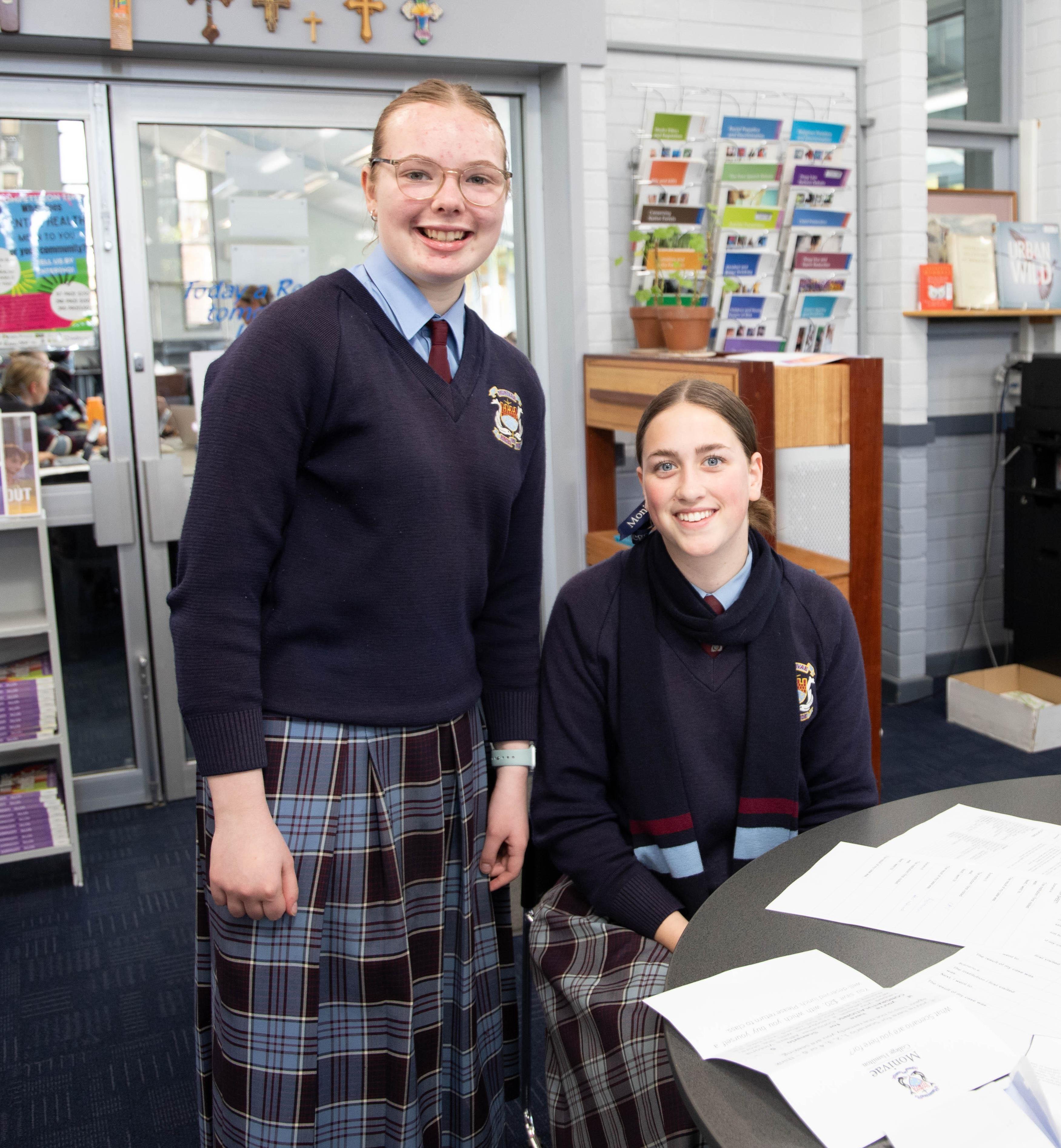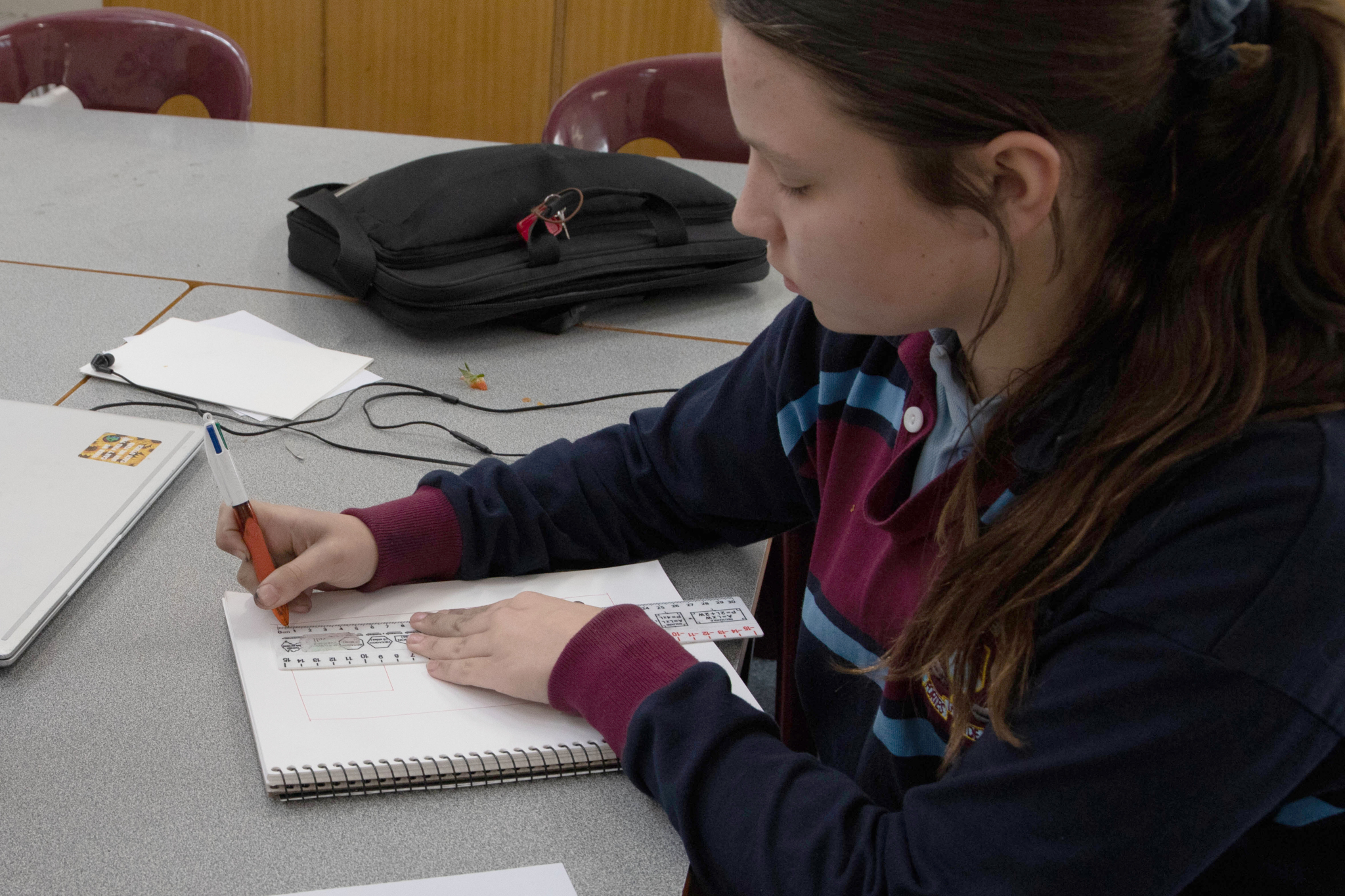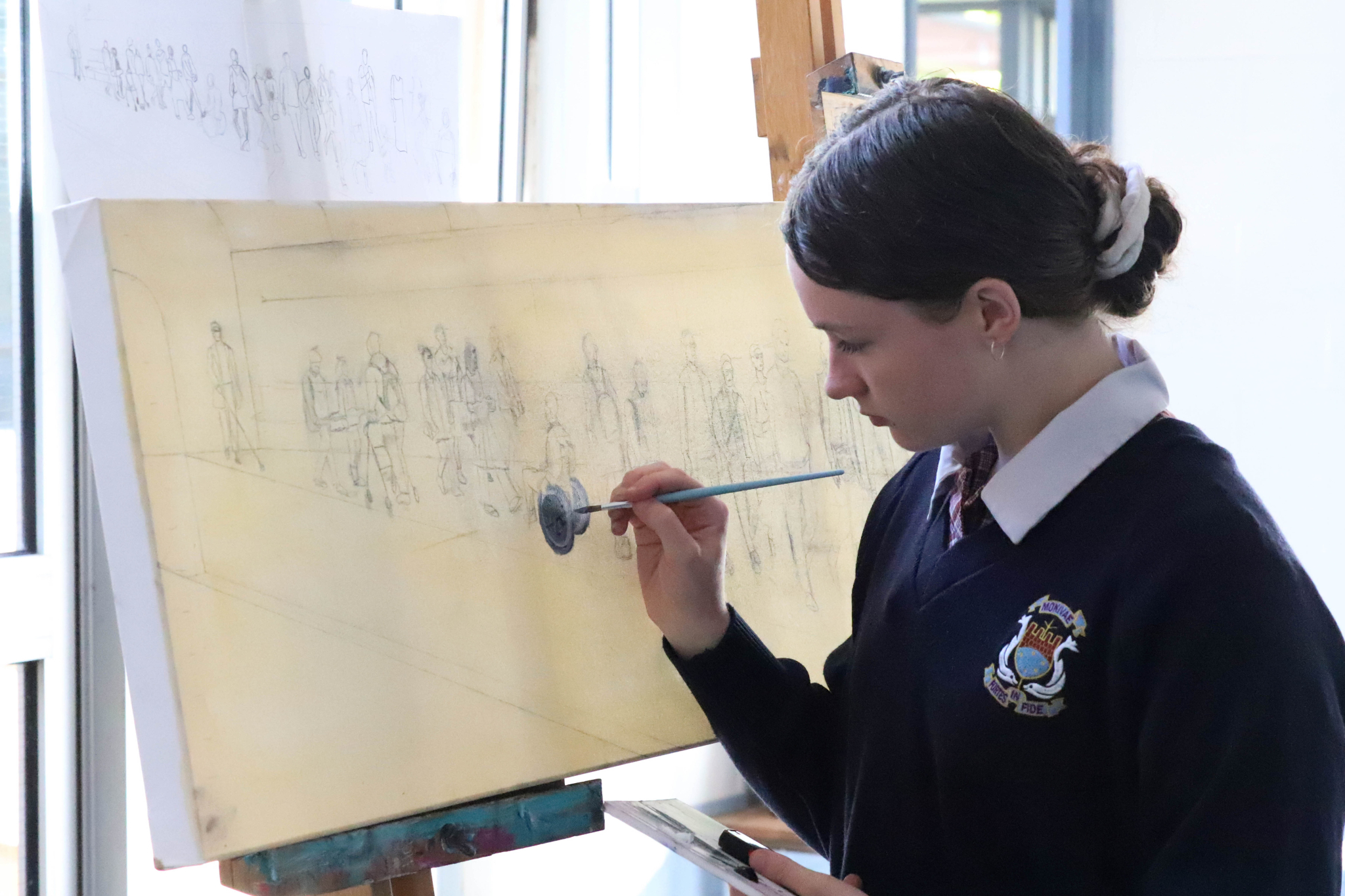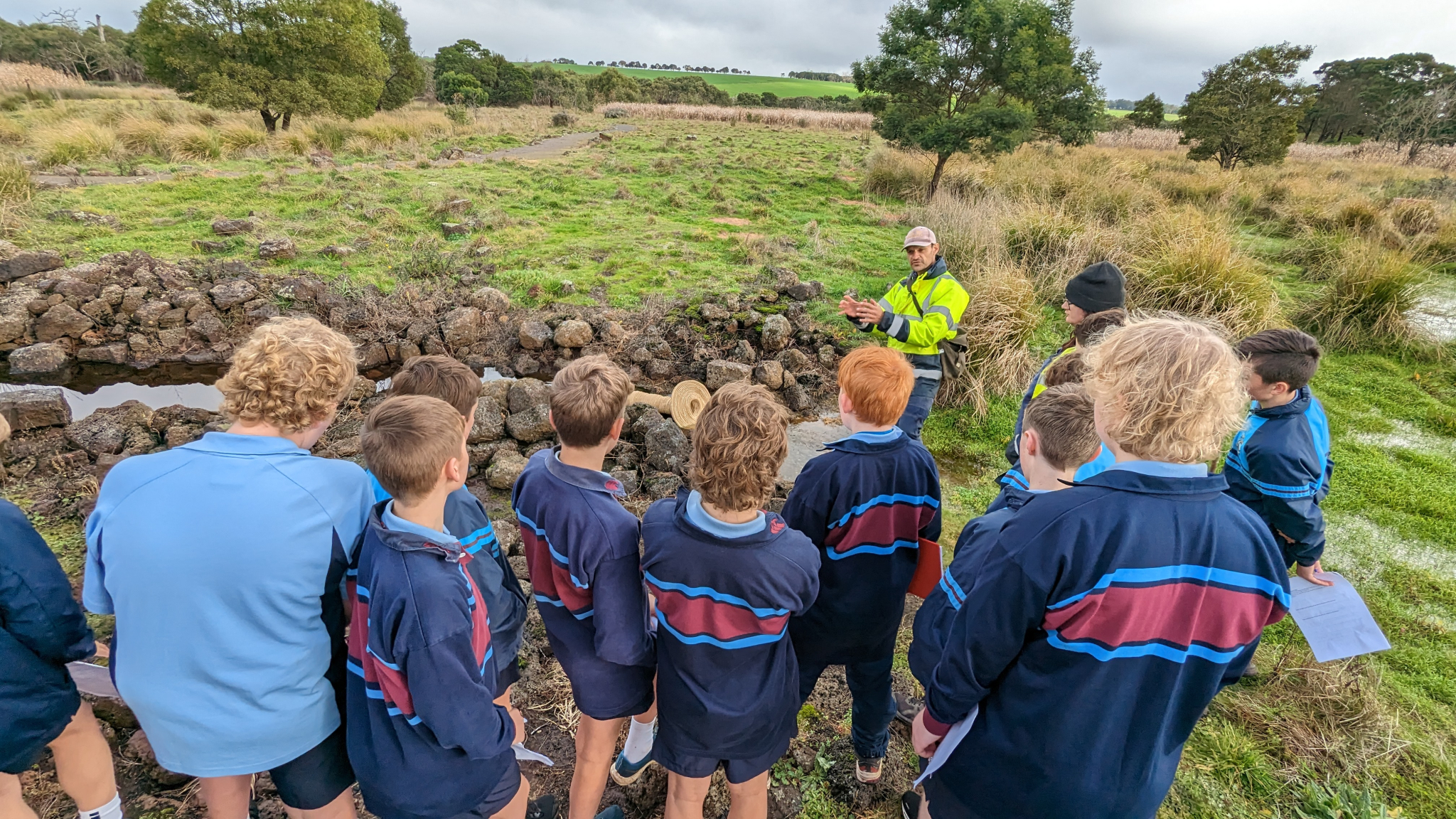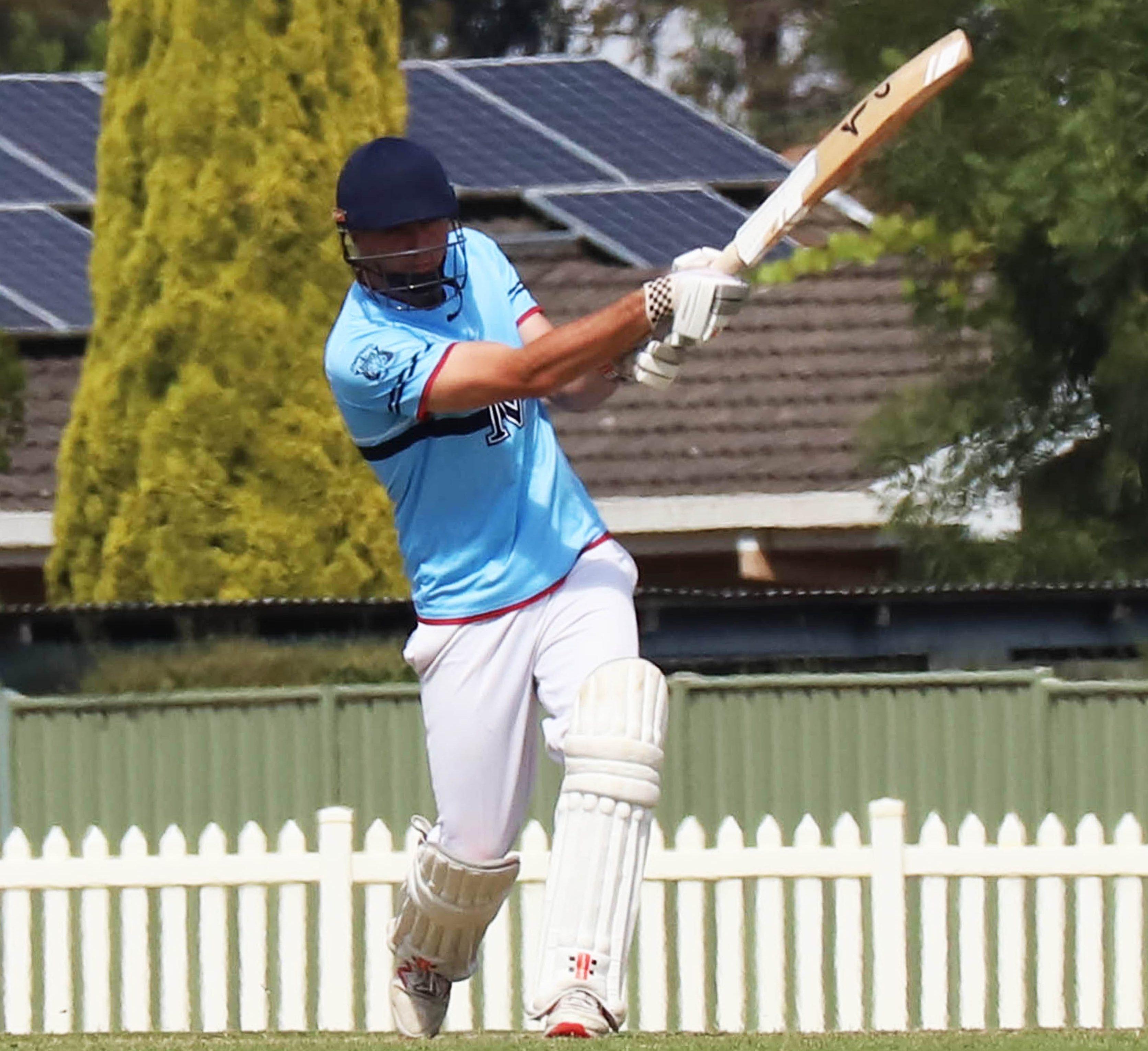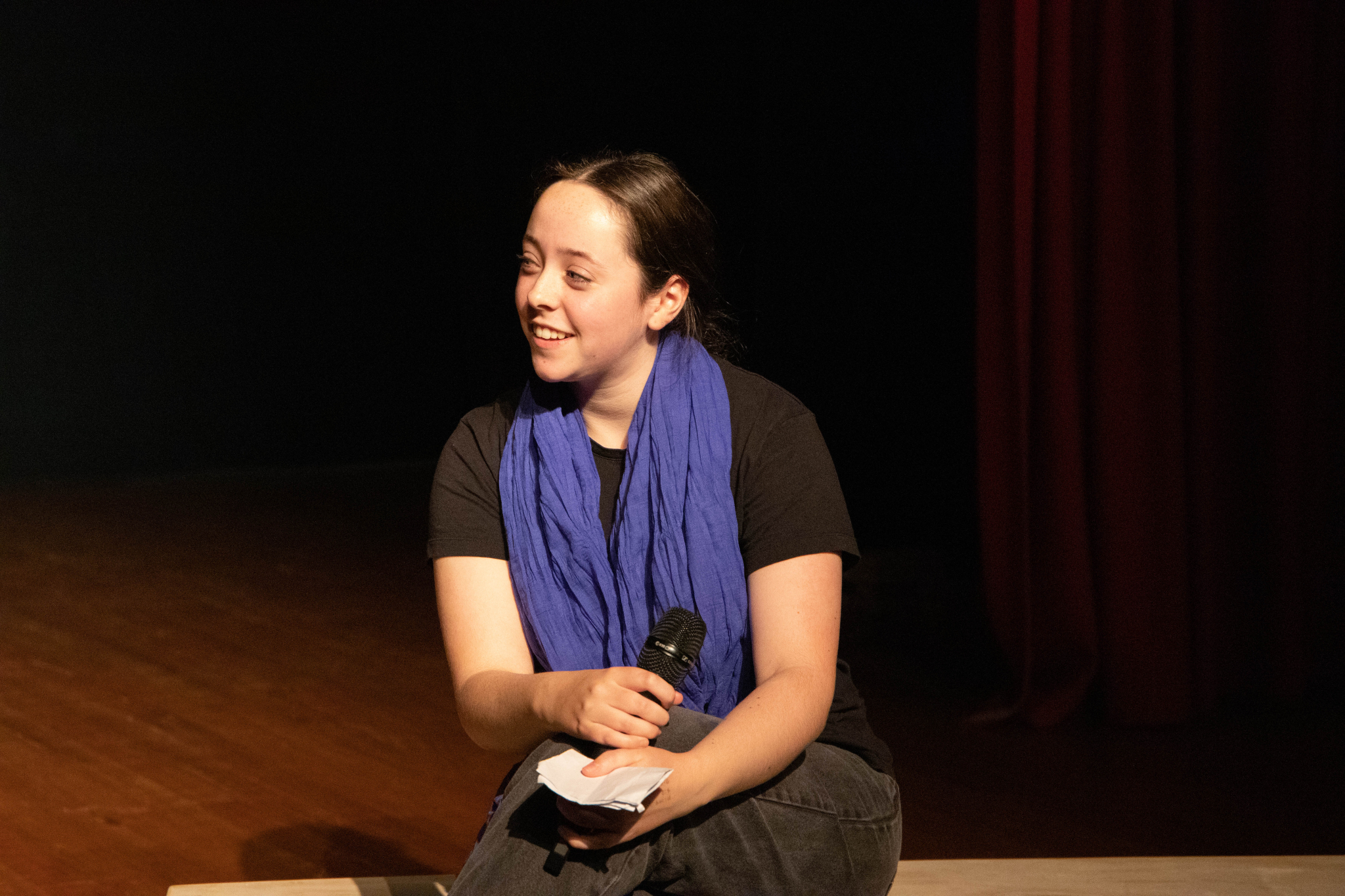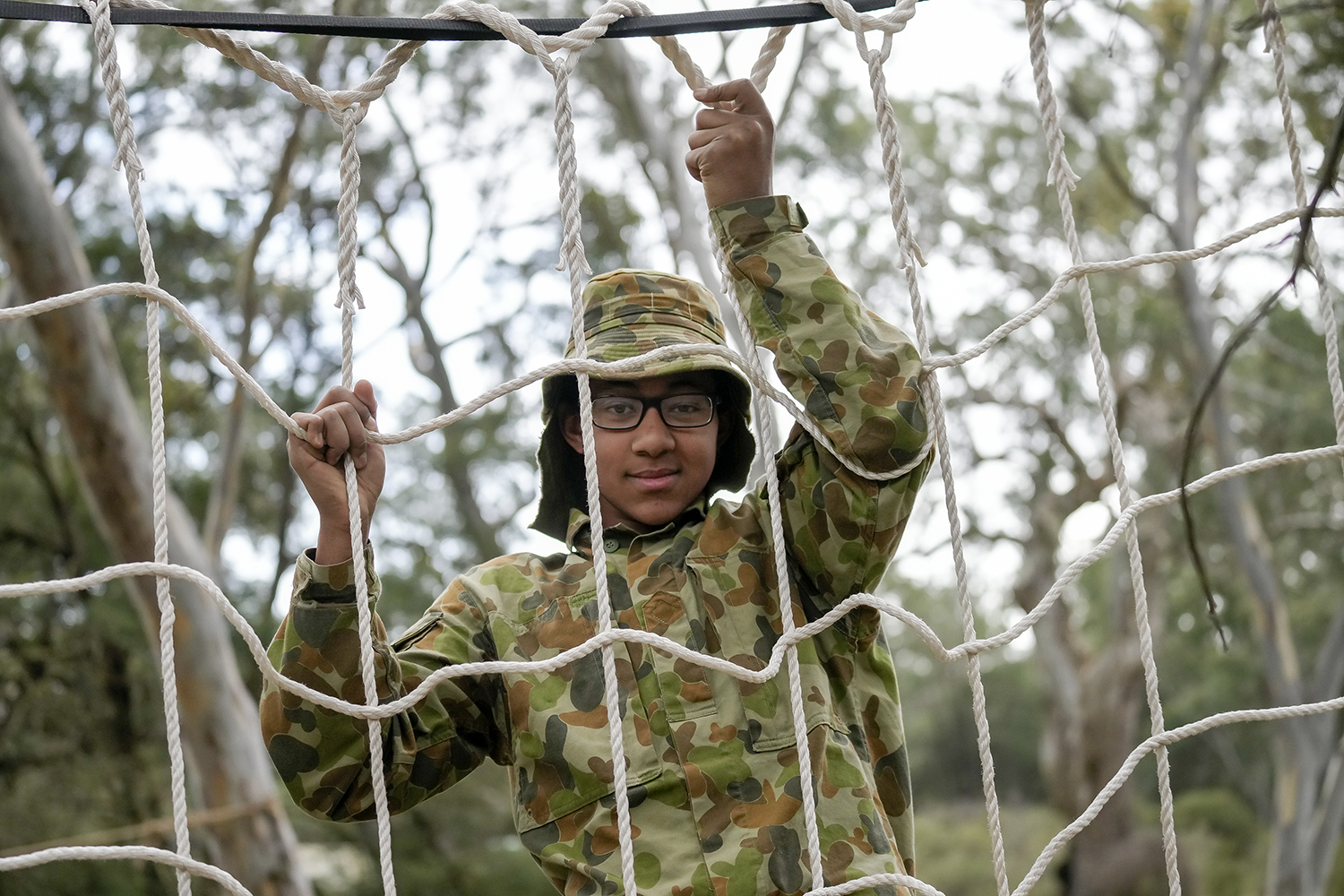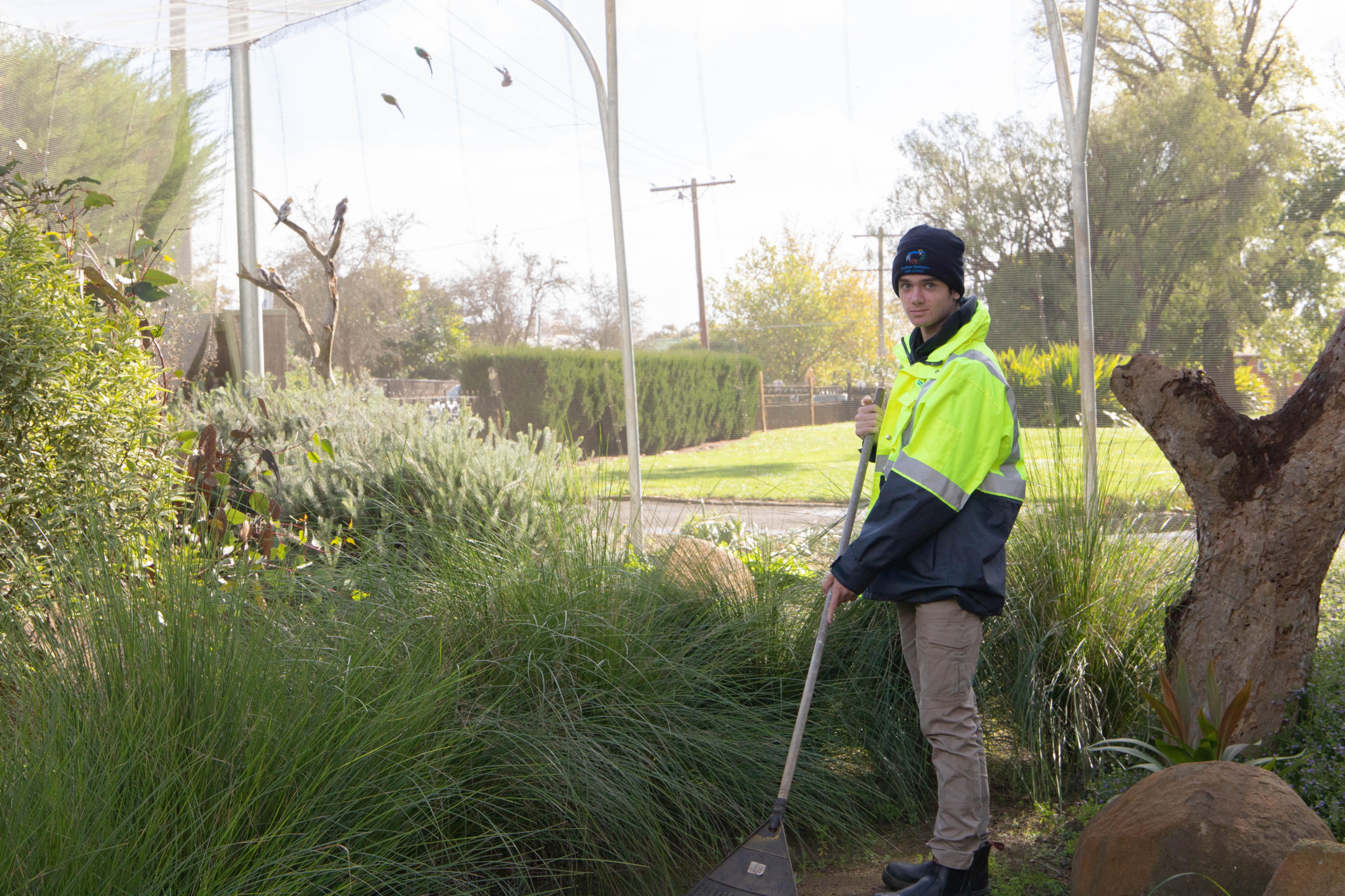Religious Education
Religious Education at Monivae College aims to prepare students to be lifelong learners and global citizens in a pluralist society where multiple worldviews co-exist. The Monivae Graduate is provided a quality Catholic education so that each person may know and be invited to experience the living spirit of Christ, informed by the Charism of Jules Chevalier and the Missionaries of the Sacred Heart.
The Monivae Religious Education Graduate will have learned about the life and message of Jesus Christ through the study of Scripture and discern what it means for them to respond to his message in their own lives. This response includes quality Christian relationships with those they meet and with whom they live, acting in a morally compatible manner with Christ’s message and the growing development of a life of faith, leading to the hope of God’s Kingdom on earth and after death.
Monivae College enrols students from all places on the continuum of Christian belief and degree of participation in the life of a Christian community. For some it is their first and only encounter with the word of God. For others it is an opportunity to deepen their faith and enhance their life in the Church. Religious Education provides the opportunity for all to participate meaningfully in the activities and processes of the course without judgment or discrimination. Students are expected to remain open to the word of God and to participate meaningfully in all activities.
YEAR 7 -AWAKENINGS |
|||||
Welcoming and Belonging |
Sacraments and Life Journeys |
Learning and Living the Bible |
Loving and Caring |
||
YEAR 8 -AWAKENINGS |
|||||
Connections Within Community |
Choices |
Being and Acting |
Questioning |
||
YEAR 9- AWAKENINGS |
|||||
Stewardship |
Global Perspectives |
Mission from Afar |
Inspirational People |
||
YEAR 10 |
|||||
Choose between Unit 1/2 R&S or Certificate of Religious Education (CORE) |
|||||
YEAR 11 |
|||||
Unit 1/2 R&S |
or |
Unit 3/4 R&S |
|||
YEAR 12 |
|||||
Unit 3/4 R&S |
or |
Australia Catholic University Pathway |
|||
English
Year 7
By the end of Year 7, students will be able to:
- Understand how and why authors construct their texts based on audience and purpose.
- Explore issues and ideas from a variety of viewpoints.
- Create texts that inform, persuade, and entertain.
- Engage in class discussion, debate, and deliver oral presentations.
Year 8
By the end of Year 8, students will be able to:
- Explain how and why authors construct their texts based on audience and purpose.
- Explain how language features, images and vocabulary are used to represent different viewpoints.
- Create texts for different purposes, selecting language to influence audience response.
- Elaborate on their ideas in class discussion and debate and create presentations designed to persuade.
Year 9
By the end of Year 9, students will be able to:
- Analyse and explain how images and text structures can
be manipulated for effect - Create texts that respond to issues, interpreting and
integrating ideas from other texts. - Manipulate language features and images to create
innovative texts. - Make presentations and contribute to class discussion.
Year 10
By the end of Year 10, students will be able to:
- Evaluate how text structures can be used in innovative ways.
- Explain different viewpoints through the development of cohesive and logical arguments.
- Articulate complex ideas through written, spoken, and multimodal texts.
- Solve problems, justify opinions and develop arguments through contributing actively to class discussion
Years 11 & 12
VCE English - focuses on how English language is used to create meaning in written, spoken and multimodal texts of varying complexity.
Literary texts selected for study are drawn from the past and present, from Australia and other cultures. Other texts are selected for analysis and presentation of argument.
The study is intended to meet the needs of students with a wide range of expectations and aspirations, including those for whom English is an additional language.
VCE Literature - focuses on the meaning derived from texts, the relationship between texts, the contexts in which texts are produced and read, and the experiences the reader brings to texts.
In VCE Literature students undertake close reading of texts and analyse how language and literary elements and techniques function within a text. Literature enables students to examine the historical and cultural contexts within which both readers and texts are situated.
Mathematics
Year 7 - 10
Mathematics aims to ensure that students:
● are confident, creative users and communicators of mathematics, able to investigate, represent and interpret situations in their personal and work lives and as active citizens
● develop an increasingly sophisticated understanding of mathematical concepts and fluency with processes, and are able to pose and solve problems and reason in Number, Algebra, Measurement, Space, Statistics and Probability
● recognise connections between the areas of mathematics and other disciplines and appreciate mathematics as an accessible and enjoyable discipline to study.
Mathematics is a sequential subject that is compulsory for all students until the end of Year 10. The subjects offered in the Mathematics Faculty are:
Year 7 Mathematics, Year 8 Mathematics, Year 9 Mainstream Mathematics, Consolidating Mathematics, Year 10 Advanced Mathematics, Mainstream Mathematics, Consolidating Mathematics
VCE MATHEMATICS
UNITS OFFERED: Units 1 & 2 / Units 3 & 4: Foundation Mathematics, General Mathematics, Mathematical Methods, Specialist Mathematics
YEAR 11 CHOICES: One Mathematics Subject (1 or 2 Units): Mathematical Methods 1 & 2, or General Mathematics 1 & 2 or Foundation Mathematics 1 & 2
Two Mathematics Subjects (4 units): Mathematical Methods 1 & 2 and Specialist Mathematics 1 & 2
YEAR 12 CHOICES One Mathematics Subject (2 units): Mathematical Methods 3 & 4 or General Mathematics 3 & 4 or Foundation Mathematics 3 & 4
Two Mathematics Subjects (4 units): Mathematical Methods 3 & 4 With Specialist Mathematics 3 & 4 or Mathematical Methods 3 & 4 With General Mathematics 3 & 4
Science
A Monivae science student is: An independent learner, A creative thinker, Engaged and Curious
Year 7
Introduction to Science and A Tangled Web – Introduction to Biology, Just the Basics – Introduction to Chemistry and Chemistry Skills, May the Force be with you – Introduction to Physics
Year 8
Mini to Massive – From atoms to the universe and how we view these, Can we build a Bionic Eye? – Sight, Light and Vision, Brave New World – all the components needed to colonise a new world, body system, ecosystems, getting there and communication home.
Year 9
Chemistry – the Periodic Table, Bonding of atoms, Nuclear energy Requirements for Life – Photosynthesis and Cellular Respiration, the nervous and endocrine systems, Electricity – Circuits, Resistance, Current and Electronics, Extended Practical Investigation – an independently designed experiment with a chemistry focus
Year 10
Chemistry – Rate of reactions and types of reactions, Genetics and Evolution – DNA, replication and types of evolution, Motion – Forces and Newtons Laws Extended Practical Investigation – an independently designed experiment based on the Year 10 course content.
Year 9 & 10 Electives
Forensics - Develop forensics skills and solve a murder
STEM - Introduction to STEM technologies and individual project work based on STEM technologies.
Agricultural Studies - Introduction to the diverse Australian agriculture, business management techniques and technology in workplaces and learn about making informed, ethical decisions for mindful agricultural engagement.
Agricultural Skills - Introduction to fundamental skills for starting an agricultural career, such as chemical and animal handling, along with plant growth experiments and excursions to local primary industries.
Inner workings of animals - Internal structures of animals from simple organisms to complex animals.
Environmental Science -An introduction to VCE Environmental Science and the environment around us with a focus on the basic skills needed for field work.
Psychology -An introduction to VCE Psychology, to prepare students for the fascinating world of our mind.
VCE - Units 1 and 2 studied in Year 11. Units 3 and 4 studied in Year 12.
Agricultural and Horticultural Studies - An interdisciplinary approach to the exploration of food and fibre production, with an overarching focus on land cultivation and the raising of plants and animals through evidence-based, sustainable and ethical practices. Focusing on the rapid rate of change in the agriculture and horticulture industries and the increasing application of innovation and data-driven initiatives Unit 1: Change and opportunity Unit 2: Growing plants and animals Unit 3: Securing the future Unit 4: Sustainable food and fibre production
Biology - Examines the dynamic relationships between organisms and their interactions with the non- living environment. It explores the processes of life, from the molecular world of the cell to that of the whole organism Unit 1: How do organisms regulate their functions? Unit 2: How is does inheritance impact on diversity? Unit 3: How do cells maintain life? Unit 4: How does life change and respond to challenges?
Psychology - is a multifaceted discipline that seeks to describe, explain, understand and predict human behaviour and mental processes. It includes many sub-fields of study that explore and seek to better understand how individuals, groups, communities and societies think, feel and act. Unit 1: How are behaviour and mental processes shaped? Unit 2: How do internal and external factors influence behaviour and mental processes? Unit 3: How does experience affect behaviour and mental processes? Unit 4: How is mental wellbeing supported and maintained?
Physics - Seeks to understand and explain the physical world. It examines the way matter and energy interact. Through observations, measurements and experiments, physicists gain a better understanding of the underlying laws of nature. Unit 1: How is energy useful to society? Unit 2: How does Physics help us understand the world? Unit 3: How do fields explain motion and electricity? Unit 4: How have creative ideas and investigation revolutionised thinking in Physics?
Environmental Science - an interdisciplinary, investigative science that explores the interactions and interconnections between humans and their environments. Unit 1: How are Earth’s dynamic systems interconnected to support life? Unit 2: What affects Earth’s capacity to sustain life? Unit 3: How can biodiversity and development be sustained? Unit 4: How can climate change and the impacts of human energy use be managed?
Visual Arts and Technology
Year 7 & 8 Subjects: Art, Digital Technology, Food Technology, Textiles, Woodwork
Year 9 Subjects: Arts, Food Technology, Textiles, Woodwork, Ceramics
Year 10 Electives; Digital Photography & Photoshop, Just Desserts, Outdoor Furniture, Sheetmetal, The Dressmaker, Skateboards, Makin' Stuff
Year 11 & 12 VCE Units 1 & 2, Units 3 & 4; Product Design & Technology, Creative Practice, Visual Communication and Design
Humanities
Year 7
Geography: Place and Liveability, Civics and Citizenship: Government and Democracy, History: Ancient Australia, Economics and Business: Consumers and Producers, Geography: Water in the World, History: Ancient Rome, History: Ancient China.
Year 8
History: The Vikings, Civics and Citizenship: Laws and Citizens, Geography: Changing Nations, History: Japan under the Shoguns. Economics and Business: The Business Environment, Geography: Landforms and Landscapes, History: Renaissance Italy
Year 9
History: Industrial revolution, History: Australia and Asia, History: World War I, Civics and Citizenship: Government and Democracy, Geography: Biomes and Food Security, Geography: Geographies of Interconnection, Economics and Business: Consumer and Financial Literacy.
Year 10
Geography: Environmental Change and Management, Geography: Geographies of Human Wellbeing, Economics and Business: Resource Allocation and Making Choices, History: World War II, History: Rights and Freedoms, History: The Globalising World, Civics and Citizenship: Laws and Citizens
Year 9/10 Electives
Major - Civics and citizenship: Making and Breaking the Law, Economics and Business: Markets and Money
Minor - Civics and citizenship: Crime and Punishment Through the Ages, Economics and Business: Your Money
Year 11/12 - VCE courses currently offered
Accounting Unit 1: Role of Accounting in Business, Unit 2: Accounting and Decision Making for a Trading Business, Unit 3: Financial Accounting for a Trading Business, Unit 4: Recording, Reporting, Budgeting and Decision-Making.
Business Management Unit 1: Planning a Business, Unit 2: Establishing a Business, Unit 3: Managing a Business, Unit 4: Transforming a Business
Geography Unit 1: Hazards and Disasters, Unit 2: Tourism: Issues and Challenges, Unit 3: Changing the Land, Unit 4: Human Population: Trends and Issues
History Unit 1: Modern history: Change and Conflict, Unit 2: Modern history: The Changing World Order, Unit 3: Revolutions: Causes of Revolution (France and Russia), Unit 4: Revolutions: Consequences of Revolution (France and Russia).
Legal Studies Unit 1: The Presumption of Innocence, Unit 2: Wrongs and Rights, Unit 3: Rights and Justice, Unit 4: The People, the Law and Reform
Health and Physical Education
The Health and Physical Education program at Monivae aims to develop skills in students that will enable them to lead healthy lifestyles, have proficient movement skills and be team players. Health literate students can make informed decisions that enhance their own and others health, safety and wellbeing. Monivae students participate in a range of sports developing movement skills, strategies, cooperation and teamplay.
Year 7
Health Topics – Nutrition and consumer health, movement skills, adolescence and change and safety and risk
Year 8
Health Topics – Relationships and bullying, drugs use, physical activity and fitness and mental health
Year 9
Health Topics – Drugs, sexual health, nutrition and mental health
Year 10
Health Topics – Risky business, men’s and women’s health issues, first aid and sports injuries and physical activity
Year 9/10 Pathway Units
Additional to the core curriculum, we also offer a number of Pathways units for Year 9 and 10 students to select as part of their elective choices. These range from OES Water and Land, Health and Human Development and Sports Science, as lead in subjects to our popular VCE units, to separate Men’s and Woman’s health units.
Sports covered across Year 7-10 include:
Fundamental movement skills, athletics, swimming, basketball, netball, dance, volleyball, cricket, soccer, badminton, table tennis, fitness testing and training,
soft-lacrosse, tennis, T-ball/softball, minor games, hockey, touch football, ultimate and various recreational pursuits such as bowls, bocce and croquet.
VCE
VCE – Health and Human Development
Over the course of Units 1 to 4 students will study the dimensions of health and wellbeing, perspectives and influences of health, nutrition, development throughout the lifespan, Australia’s healthcare system, the promotion of health and wellbeing both in Australia and in a global context and the UNs Sustainable Development Goals.
VCE – Physical Education
Over the course of Units 1 to 4 students will study the human body in motion, biomechanics, physiological changes and adaptations to physical activity, issues in sport and physical activity, energy systems, fitness components and design a 6-week training program.
VCE – Outdoor and Environmental Studies.
Over the course of Units 1 to 4 students will study their connections with outdoor environments including exploring the outdoors and our place in outdoor environments. They will participate in safe and sustainable outdoor experiences where they learn to understand outdoor environments and human impacts on these environments. Students will analyse human relationships with outdoor environments and study the importance of healthy outdoor environments.
Performing Arts - Drama
Learning in Drama allows a student to think, move, speak and act with confidence. They learn to engage with expression and exploration of personal, cultural and social worlds through role and situation that engages, entertains and challenges. Students create meaning as drama makers, performers and audiences as they enjoy and analyse their own and others’ stories and points of view.
A Monivae Drama Student is: confident, has self-esteem to explore, depict and celebrate human experience, take risks and challenge their own creativity through drama
Year 7
Mime and Non-Verbal Communication, Storytelling, Communication and Vocal Skills, Shakespeare and How Language Evolves, Summer of the Aliens, Improvisation and Theatre Sports
Year 8
History of Theatre, Drama Terminology and Styles, Melodrama, Epic Theatre, Honey Spot, Shadow Puppetry, Shakespeare- Macbeth
Year 9 (elective option)
Wolf Lullaby, Stanislavsky Style, Ensemble Performance, Brecht, Social Issues and Play Bucket, Mini Solos, Reviewing Professional Theatre
Year 10 (elective option)
Theatre of the Grotesque, Stanislavski and Rehearsal Techniques, Shakespeare Monologue
VCE Drama
Unit 1 Introducing performance styles.
AOS 1 Creating a devised performance
AOS 2. Presenting a devised performance
AOS 3 Analysing a devised performance
AOS 4 Analysing a professional drama performance
Unit 2 Australian Identity
AOS 1 Using Australia as an inspiration
AOS 2 Presenting a devised performance
AOS 3 Analysing a devised performance
AOS 4 Analysing a Australian drama performance
Unit 3. Devised ensemble performance.
AOS1 Devising and presenting and ensemble performance
AOS 2 Analysing a devised performance
AOS 3 Analysing and evaluation of a professional drama performance
Unit 4. Devised Solo performance
AOS1 Demonstration techniques of solo performance
AOS 2 Devising a Solo Performance
AOS 3 Analysing and evaluating a devised solo performance
Co Curricula opportunities:
Performance Nights, College Musical
Performing Arts - Music
Learning in Music combines listening, composing and performing activities.
These activities are developed sequentially and can be enhanced by participating in the various co curricula opportunities.
A Monivae music student that is: confident, innovative, thoughtful, skilled and informed.
Year 7 Music:
Band Program, Reading Music and Composition, Instruments of the Orchestra and Concert Band, Solo Performance.
Year 8 Music
History of Rock Music, Rock Music: Performance Skills, Rock Music: Ensemble Skills, Advertising Jingles
Year 9 Music (an elective option)
Orchestral Music, Solo and Ensemble Performance, Music Language, Composition, The Musical
Year 9 – Music the Performer (A major elective option)
Music Performance, Develop performance skills as a soloist and within a group, Learn how to perform confidently and harness nerves, Develop advanced skills and techniques on your instrument
Year 10 Music (an elective option)
Blues Music: The origins and structure of Blues Music throughout history, Blues Music Composition: Writing a piece of music in Blues Style,
Solo and Ensemble Performance: Refining and developing rehearsal and performance skills to present more than one work. Music Language: Learning more complex scales and chords aurally and in written form.
VCE Music Performance
Unit 1- Organisation of Sound
AOS 1: Performing
AOS 2: Creating
AOS 3: Analysing and Responding
Unit 2- Effect in Music
AOS 1: Performing
AOS 2: Creating
AOS 3: Analysing and responding
Unit 3 Music Repertoire Performance
AOS 1: Performing
AOS 2: Analysing for performance
AOS 3: Responding
Unit 4
AOS 1: Creating
AOS 2: Analysing for performance
AOS 3: Responding
Unit 3 Music Contemporary Performance
AOS 1: Performing
AOS 2: Analysing for performance
AOS 3: Responding
Unit 4
AOS 1: Performing
AOS 2: Analysing for performance
AOS 3: Responding
Cadets
Years 8 - 12
Cadets is offered from Year 8-12. In Year 8, all students are given the opportunity to complete their recruit training. The students are taught the core values of the Australian Army Cadets through teamwork, resilience and military like experiences. These values are: Service, Courage, Respect, Integrity and Excellence.
Year 8 Recruits:
In Year 8, cadets will experience and learn:
- A bivouac (overnight camp) and annual camp
- Military like experiences – discipline, formal parades, navigation, radio communication, first aid in a bush setting
- History and Structure of the Australian Army Cadets
- Teamwork, fitness, endurance
- Opportunity to attend Specialist Courses at military bases within Victoria
- Opportunity to parade at ANZAC and Remembrance Days
Year 9-12 (elective):
In Year 9-12, the cadets will further their cadet training in a senior role as well as:
- Leadership camps within unit and at Battalion level
- Further bivouacs within the Battalion
- Opportunity to attend Promotional Leadership Courses
- Opportunity to attend Specialist Courses
- Parading at ANZAC and Remembrance Day
- Leadership and specialist opportunities within the unit
Students may join/re-join at any year level.
As a Monivae College cadet, you are not a member of the Australian Defence Force.
Indonesian
VCE Vocational Major
VCE VM is a nationally recognized Senior Certificate vocational course at Years 11 &12, attained over two years.
Monivae partners with providers to offer Building and Construction, Salon and Retain Cosmetics, Hospitality, Automotive, Screen and Media, Health Services, Early Childhood, Health Services. VET units include Sports Coaching (Units 1 & 2), Sport and Recreation (Units 1,2,3,4) and Engineering (Units 1,2,3,4).
Subject selection is based around 4 compulsory strands 1. Literacy Numeracy, 2. Industry Specific (VET) 3.WRS Work Related Skills & 4.PDS Personal Development Skills
VCE VM students are able to choose a wider range of VET courses and SBAs (School Based Apprenticeships) than other students
Monivae VCE VM students have over all the years had a very good range of successful career outcomes in full-time apprenticeships, full-time TAFE courses and full-time employment
The wide acceptance of VCE VM is reflected in employers now requesting & preferring to take VCE VM students for employment & apprenticeships due to their job readiness
In doing VCE VM students need a vocational area of interest as they have to do VET as either a SBA or VDSS (VET delivered to Secondary Schools) & work placement each Thursday that relates to it
Students see the positives of VCE VM as being hands on, work related, allowing them to succeed in a vocational area of interest, enjoying a variety of locations away from school & the opening up options that provide a pathway that is flexible to meet practical & academic needs
Year 11 & 12 VCE VM Course
Literacy, Numeracy, Religious Education, Structured Workplace Learning (one day per week in chosen workplace), VET subject or School-based apprenticeship (SBA), Personal Development Skills (PDS), Work Related Skills (WRS), Cert II & Cert III Business







